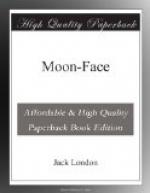“It is my right,” the girl repeated.
“I know it,” he answered, desperately and helplessly.
She waited, in the silence which followed, her eyes fixed upon the light that filtered down through the lofty boughs and bathed the great redwood trunks in mellow warmth. This light, subdued and colored, seemed almost a radiation from the trunks themselves, so strongly did they saturate it with their hue. The girl saw without seeing, as she heard, without hearing, the deep gurgling of the stream far below on the canyon bottom.
She looked down at the man. “Well?” she asked, with the firmness which feigns belief that obedience will be forthcoming.
She was sitting upright, her back against a fallen tree-trunk, while he lay near to her, on his side, an elbow on the ground and the hand supporting his head.
“Dear, dear Lute,” he murmured.
She shivered at the sound of his voice—not from repulsion, but from struggle against the fascination of its caressing gentleness. She had come to know well the lure of the man—the wealth of easement and rest that was promised by every caressing intonation of his voice, by the mere touch of hand on hand or the faint impact of his breath on neck or cheek. The man could not express himself by word nor look nor touch without weaving into the expression, subtly and occultly, the feeling as of a hand that passed and that in passing stroked softly and soothingly. Nor was this all-pervading caress a something that cloyed with too great sweetness; nor was it sickly sentimental; nor was it maudlin with love’s madness. It was vigorous, compelling, masculine. For that matter, it was largely unconscious on the man’s part. He was only dimly aware of it. It was a part of him, the breath of his soul as it were, involuntary and unpremeditated.
But now, resolved and desperate, she steeled herself against him. He tried to face her, but her gray eyes looked out to him, steadily, from under cool, level brows, and he dropped his head upon her knee. Her hand strayed into his hair softly, and her face melted into solicitude and tenderness. But when he looked up again, her gray eyes were steady, her brows cool and level.
“What more can I tell you?” the man said. He raised his head and met her gaze. “I cannot marry you. I cannot marry any woman. I love you—you know that—better than my own life. I weigh you in the scales against all the dear things of living, and you outweigh everything. I would give everything to possess you, yet I may not. I cannot marry you. I can never marry you.”
Her lips were compressed with the effort of control. His head was sinking back to her knee, when she checked him.
“You are already married, Chris?”
“No! no!” he cried vehemently. “I have never been married. I want to marry only you, and I cannot!”
“Then—”
“Don’t!” he interrupted. “Don’t ask me!”




